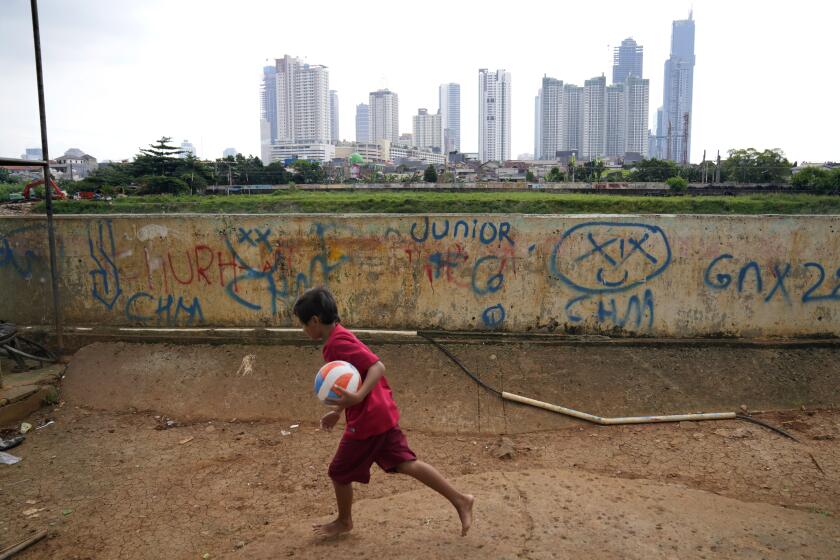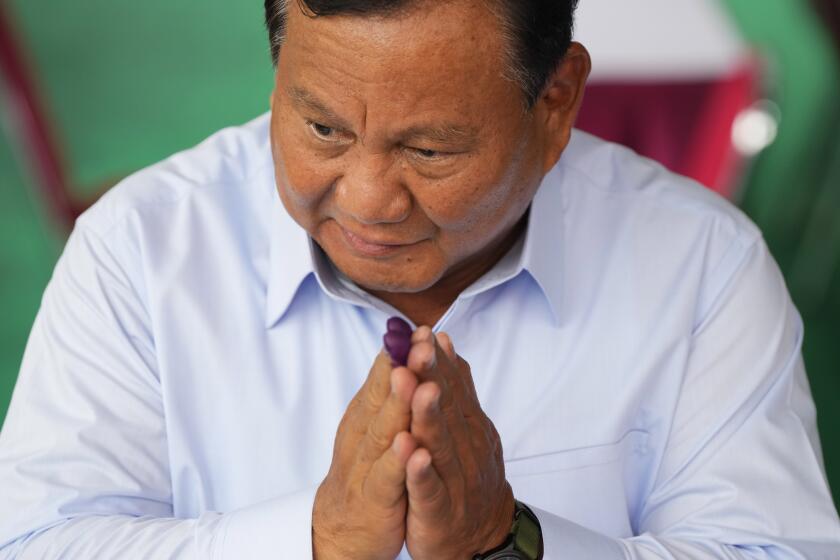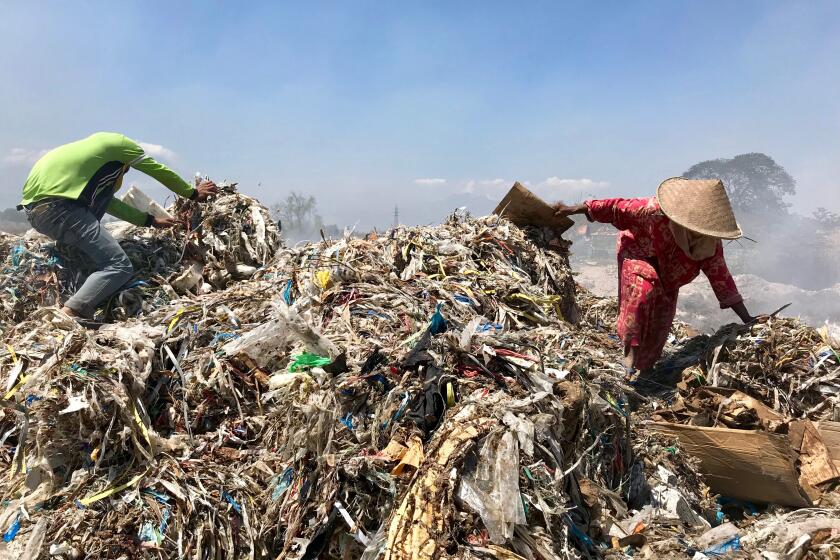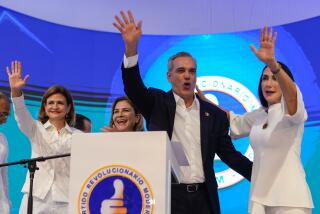Indonesia’s defense minister announced as country’s next president

- Share via
JAKARTA, Indonesia — Indonesian Defense Minister Prabowo Subianto was announced the winner of last month’s presidential election Wednesday over two former governors who have vowed to contest the result in court over alleged irregularities.
Subianto, who has links to the past dictatorship and chose the son of the popular outgoing president as his running mate, won 58.6% of the votes in the world’s third-largest democracy. Former Jakarta Gov. Anies Baswedan received 24.9% and former Central Java Gov. Ganjar Pranowo got 16.5%, the General Election Commission said. It posted polling stations’ tabulation forms on its website, allowing for independent verification.
Nearly 5,000 police officers were on alert in Jakarta, the capital, anticipating protests from the losing candidates’ supporters. The election commission’s headquarters were barricaded with razor wire.
About 300 demonstrators held banners and signs criticizing outgoing President Joko Widodo for supporting Subianto and alleging widespread fraud. They burned rubbish near the election commission compound, along with photos of the president.
In Indonesia, election challenges can be registered with the Constitutional Court during the three days following the announcement of official results. Baswedan and Pranowo have refused to concede and said they plan to file challenges.
An ex-general with ties to Indonesia’s popular outgoing president as well as the country’s brutal dictatorial past looks set to be its next leader.
The two other candidates have alleged fraud in the election process, citing the vice presidential candidacy of Widodo’s son. Widodo is serving his second term and could not run again, but his son’s candidacy has been seen as a sign of his tacit backing of Subianto.
Widodo’s son, Gibran Rakabuming Raka, is 37 but became Subianto’s running mate after the Constitutional Court made an exception to the minimum age requirement of 40 for candidates. The court’s chief justice, who is Widodo’s brother-in-law, was then removed by an ethics panel for failing to recuse himself and for making last-minute changes to election candidacy requirements.
The new president will be inaugurated on Oct. 20 and will have to appoint a Cabinet within two weeks.
Subianto had claimed victory on election day after unofficial tallies showed he was winning nearly 60% of the votes.
Voter turnout for the Feb. 14 election was about 80%, the election commission said.
Jakarta is congested, polluted, prone to earthquakes and rapidly sinking into the Java Sea, which is why the government is moving it to Borneo.
Subianto won in 36 of 38 provinces and received 96.2 million votes compared with 40.9 million for Baswedan, the second-place finisher, who won in two provinces. Baswedan, the former head of an Islamic university, won a massive majority in the conservative westernmost province of Aceh.
Pranowo, the candidate of the governing Indonesian Democratic Party of Struggle, received 27 million votes and did not win any provinces.
Todung Mulya Lubis, a prominent lawyer who represents Pranowo, asserted that election irregularities occurred before, during and after the polls.
Widodo has dismissed the fraud allegations, saying the election process was watched by many people, including representatives of the candidates, the election supervisory agency and security personnel.
“Layered supervision like this would eliminate possible fraud,” Widodo told reporters last month. “Don’t scream fraud. We have mechanisms to solve the fraud. If you have evidence, take it to the Election Supervisory Agency. If you have evidence, challenge it to the Constitutional Court.”
The campaign teams of Baswedan and Pranowo said they would provide evidence for their claims.
Prabowo Subianto, an ex-special forces commander linked to Indonesia’s former dictator, claims victory in the presidential election, based on unofficial tallies.
But Lubis said his team has had difficulty getting witnesses to testify in court due to alleged intimidation by authorities. He acknowledged that successfully challenging the election result with such a wide official margin of victory will be difficult.
The ethics panel that removed Anwar Usman as the court’s chief justice allowed him to remain on the court under certain conditions, including banning him from involvement when the court adjudicates election disputes this year.
That means any such cases brought to the court would be decided by eight justices instead of all nine members.
Subianto’s campaign highlighted the Widodo administration’s progress in reducing poverty and vowed to continue the modernization agenda that has brought rapid growth and vaulted Indonesia into the ranks of middle-income countries.
But Subianto has laid out few other concrete plans for his presidency, leaving observers uncertain about what his election will mean for the country’s growth and its still-maturing democracy.
Subianto lost two previous presidential elections to Widodo, and the Constitutional Court rejected his bids to overturn those results because of unfounded fraud allegations.
Asia’s crackdown on plastic waste, aimed at protecting the environment, is bad news for small-time recyclers in Indonesia who make a living sorting foreign garbage.
This time, Subianto embraced the popular leader and styled himself as his heir. His choice of Widodo’s son as his running mate raised concerns about an emerging dynastic rule in Indonesia’s 25-year-old democracy.
Subianto comes from one of the country’s wealthiest families. His father was an influential politician who was a government minister under both the dictator Suharto and the country’s first president, Sukarno.
Questions also are still unanswered about Subianto’s alleged links to torture, disappearances and other human rights abuses in the final years of the brutal Suharto dictatorship, in which he served as a special forces lieutenant general.
Subianto was expelled by the army over accusations that he played a role in the kidnappings and torture of activists and other abuses. He never faced a trial and vehemently denies any involvement, although several of his men were tried and convicted.
It’s not clear how Subianto will respond to political dissent, street protests and critical journalism. Many activists see his links to the Suharto regime as a threat.
Niniek Karmini writes for the Associated Press.
More to Read
Sign up for Essential California
The most important California stories and recommendations in your inbox every morning.
You may occasionally receive promotional content from the Los Angeles Times.














